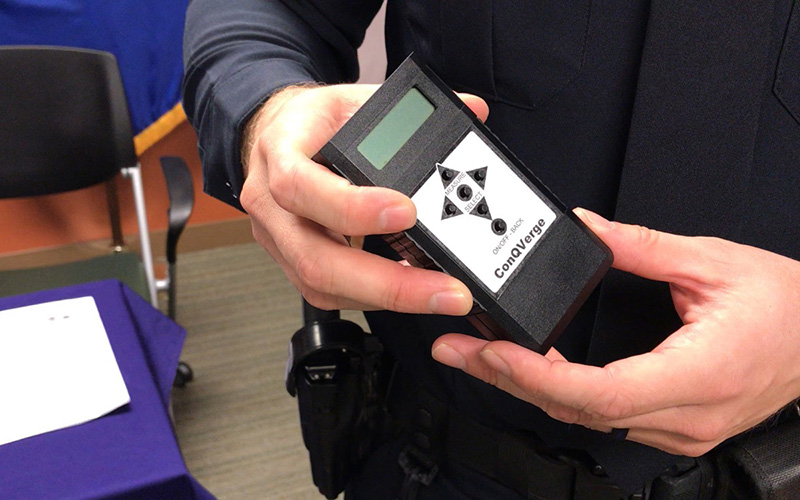
The Mesa Police Department will be using an eye tracking device called ConQVerge that can gather data and help determine if domestic violence victims have received a concussion. (Photo by Tanner Stechnij/Cronkite News)
SCOTTSDALE – Maricopa County prosecutors, Mesa police and health care leaders are teaming up to research the prevalence of concussions in domestic violence victims.
County prosecutors said a study could lead to better treatment for domestic violence victims as well as more prosecutions against their attackers.
The county attorney’s office dealt with more than 1,400 cases involving domestic violence last year, said Hilary Weinberg, who leads the family violence bureau.
“A great deal of those were related to intimate partner violence,” Weinberg said. She reached out to the Mesa Police Department, researchers and leaders in the medical field for help.
Although concussions are more closely associated with football players and other athletes, domestic violence victims may be more at risk of traumatic brain injuries, Erin Bertino, a nurse supervisor at Honor Health, said at a news conference Thursday.
The yearlong study, which will start in November, will hope to get a better understanding of frequency of concussions in domestic violence victims. The data will be used to determine the best practices for improving the lives and health of the victims.
The research could lead to stronger cases for prosecution, the team said.
“The victims in our cases may not remember a lot of details or things about their attack,” Weinberg said. “Sometimes, this lack of memory is used by juries that they may be not telling the truth about things. However, we really think that this lack of memory could be a symptom of a concussion.”
Weinberg believes this study could help change legal language about inflicting traumatic brain injury on partners.
Patrol officers at the Mesa Police Department are being trained to use a screening tool that can help determine if someone has a concussion. Sgt. Mark Higbee said 45 patrol units will have access to the tool that tracks eye movement and collects data.
Officers respond to about 200 domestic violence calls a week.
“The officers, at any time they respond to a severe domestic violence case, they’ll have access to this device,” Higbee said. “That data will be sent to our research partners who will also continue to work and follow up with the victims on these serious cases, ensuring they go to the Family Advocacy Center and our forensic nurses who will do additional tests.”
Nurses will gather data at Family Advocacy Center locations in Mesa as they provide medical care and other services to the victims.
Bertino said the county attorney’s office approached them a year ago to see if they were seeing suspected domestic violence victims who reported getting hit in the head or sustaining a traumatic head injury.
“Our units see well over 200 patients a month and it is about 50 percent sexual assault and 50 percent domestic violence,” Bertino said.
The center has law enforcement, medical professionals, social workers and patient advocates under one roof.
“The question is, to what extent does traumatic brain injury impact the concept of domestic violence and those survivors of domestic violence,” said Jonathan Lifshitz, a scientist at the Barrow Neurological Institute.